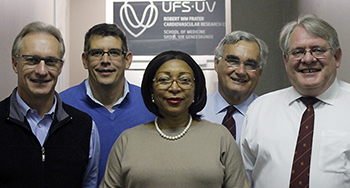Latest News Archive
Please select Category, Year, and then Month to display items
12 October 2020
|
Story Arina Engelbrecht
|
Photo Supplied
 Arina Engelbrecht from Organisational Development and Employee Well-being believes physical activity has a number of benefits for one’s health, including stress relief.
Arina Engelbrecht from Organisational Development and Employee Well-being believes physical activity has a number of benefits for one’s health, including stress relief.
Being physically active plays a big role in preventing the development of mental-health problems and in improving the quality of life of people experiencing mental-health problems.
Treatment for depression
Physical activity can be an alternative treatment for depression. It can be used as a stand-alone treatment or in combination with medication and/or psychological therapy. It promotes all kinds of changes in the brain, including neural growth, reduced inflammation, and new activity patterns are formed that promote feelings of calm and well-being. It releases endorphins – powerful chemicals in the brain that energise your spirit and make you feel good.
Physical activity can be very effective in relieving stress. Research in adults has found that physically active individuals tend to have lower stress levels compared to individuals who are less active. It also leads to improved sleep. When a person sleeps better and feels more rested, overall quality of life improves. They cope better with daily life stressors.
Reduce Alzheimer's risk
Regular physical activity can reduce your risk of developing Alzheimer's disease by up to 50%. It can also slow down further deterioration in those who have already started to develop cognitive problems. It stimulates the brain’s ability to maintain old connections as well as to make new ones.
A study asked people to rate their mood immediately after periods of physical activity (e.g. going for a walk/run, cycling, doing housework) and periods of inactivity (e.g. reading a book or watching television). Researchers found that participants felt more content, more awake, and calmer after being physically active compared to after periods of inactivity.
In conclusion, people who are physically active feel a sense of well-being, feel more energetic throughout the day, sleep better at night, have sharper memories, and feel more relaxed and positive about themselves and their lives.
“Being physically active not only changes your body, it changes your mind,
attitude, and your mood.” – Arina Engelbrecht
UFS cardiac team leading with project
2017-05-31

Prof Peter Schultheiss of the Charité University in Berlin,
Germany, visited the Robert WM Frater Centre for
Cardiovascular Research at the UFS for a study regarding
cardiomyopathy, a significant cause of fatal heart failure
among Africans. From the left are Dr Glen Taylor,
Dr Danie Buys, Prof Makoali Makatoko,
Prof Schultheiss and Prof Francis Smit.
Photo: Rulanzen Martin
A team of cardiac doctors associated with the Robert WM Frater Cardiovascular Research Centre at the University of the Free State’s (UFS) Faculty of Health Sciences has commenced with a pioneering research project regarding idiopathic dilating cardiomyopathy.
An Afrocentric research focus
Prof Francis Smit, Head of the Department of Cardiothoracic Surgery at the UFS and Head of the Frater Centre, describes dilating cardiomyopathy as a heart muscle disease that is quite common, particularly among people of African descent. The disease weakens the heart muscle, which in turn leads to heart failure.
“To date there is no curable treatment for this condition and 50% of patients that have shown heart failure, died within a period of five years. The causes of this condition have been unknown in the majority of patients. But over the past few years major strides have been made where virus infections of the heart muscle or myocarditis have been identified as a possible underlying cause. Various genetic diseases are also linked to it,” says Prof Smit.
International collaborations ensure success
According to Prof Smit, the project is being run in conjunction with Prof Heinz-Peter Schultheiss of the Charité University and the Institute for Cardiac Diagnostics and Therapy in Berlin, Germany.
“We have been working on the project over the past 18 months and I have twice visited Prof Schultheiss in Germany. He is now visiting us in Bloemfontein. We have established a collaborative project focused on patients in central South Africa”.
Prof Schultheiss is a world leader regarding the diagnosis, pathology and treatment of dilating cardiomyopathy, says Prof Smit.
“He brings a lifetime of research experience to Bloemfontein and is internationally renowned as the father of myocardial or heart muscle biopsies.
“His pioneering work on the discipline has led to diagnostic accuracy that has induced purposeful and personalised treatment of dilating cardiomyopathy and has brought about dramatic changes in some subsets of patients’ life expectancy and their cure.”
Solving problems close to home
According to Prof Mokoali Makatoko, Head of the Department of Cardiology, there are more than 1500 new cases of heart failure identified annually at the Universitas Academic Hospital, of which approximately 30% are attributed to cardiomyopathy. “With the use of endomyocardial biopsies the team hopes to treat viruses unique to Southern Africa as well as other underlying causes of dilating cardiomyopathy.”
Prof Stephen Brown, Head of Paediatric Cardiology at the Universitas Academic Hospital, says children suffering from this disease never reach a mature age and those under his supervision will also be undergoing these tests. Various other departments at the UFS will also participate in this project. Profs Makatoko and Brown did the first four endomyocardial biopsies under the management of Prof Schultheiss during the past week. The results will be available in the coming weeks after which the project will be officially launched and patient recruitment will start in earnest.